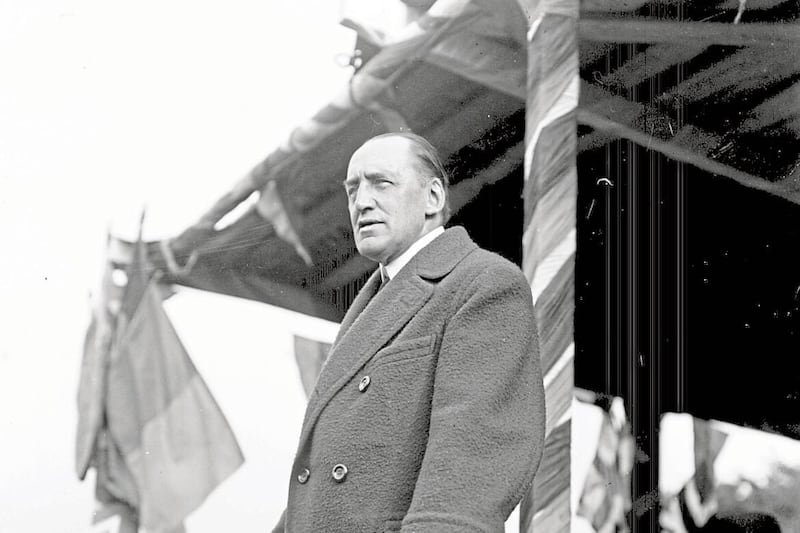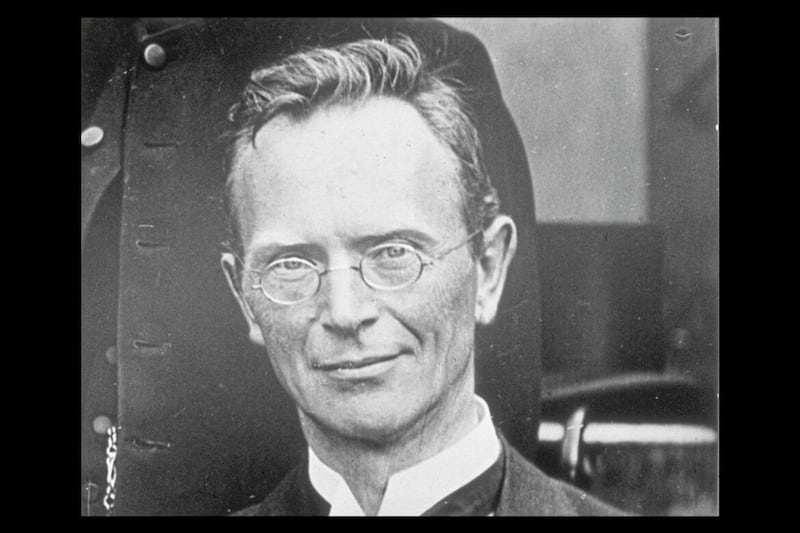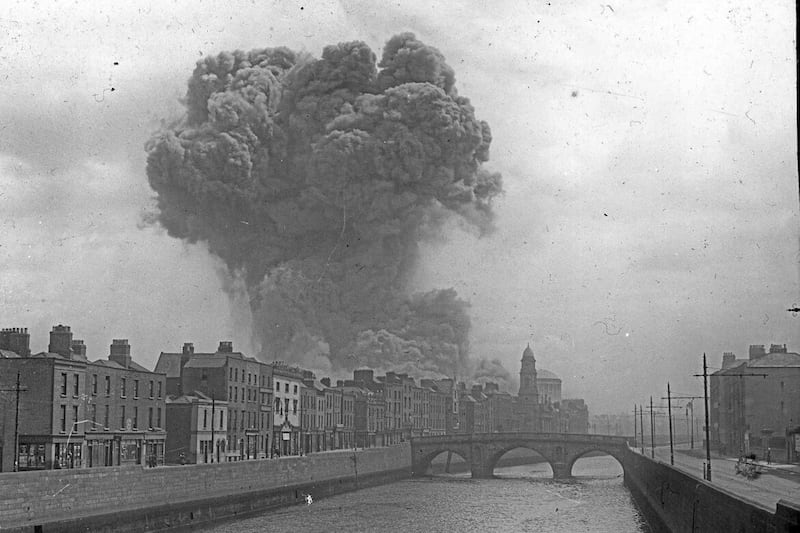In May 1923, Armagh-born and newly appointed anti-Treaty IRA chief of staff Frank Aiken issued an order to republicans to dump their arms, thus bringing an end to the hostilities of the 11-month long civil war.
While the civil war was a cataclysmic blow and the worst possible start for the Irish Free State as it embarked on its independence journey, it proved timely and beneficial to the Northern Ireland government, allowing the north to consolidate its position as a political entity.
Before the civil war broke out with the attack on the Four Courts in Dublin in late June 1922, there was a civil war in all but name in Northern Ireland. Over 270 people were killed in Belfast in the first half of 1922, most of them civilians. Despite its lofty aims, the pro- and anti-Treaty IRA’s ‘Northern Offensive’ in May 1922 never had any chance of bringing down the northern government.
The offensive was terminally impeded by both IRA factions looking over their shoulders on events further south, resulting in it petering out.
While some in the IRA in the 26 counties cared deeply about the north and were determined to end partition, including the chairman of the Free State’s provisional government Michael Collins, by June 1922 all attention was diverted to the grave matters enveloping the south. What little chance the northern IRA had of success was over and many of its members moved south to join either the pro- or anti-Treaty sides.
This, coupled with the large-scale enforcement of the draconian Special Powers Act following the killing of Ulster Unionist MP WJ Twaddell in May, which saw large numbers of IRA members being interned or forced to flee, resulted in IRA northern activity falling off a cliff and remaining almost dormant for decades.
The Northern Ireland government maintained its siege mentality even though the so-called siege had been lifted by the summer of 1922. Its security apparatus remained bloated for years.
Measures to disenfranchise Catholics and nationalists such as the removal of proportional representation (PR) for local elections, insisting on an oath of allegiance to the king and the Belfast parliament, and gerrymandering areas previously controlled by nationalists were introduced.
Michael Collins argued that the purpose of the bill to remove PR was "to oust the Catholic and Nationalist people of the Six Counties from their rightful share in local administration" and "to paint the Counties of Tyrone and Fermanagh with a deep Orange tint".
Winston Churchill, British Secretary of State for the Colonies at the time with responsibility for both Irish jurisdictions, agreed with Collins and persuaded the Lord Lieutenant of Ireland, Viscount FitzAlan, to withhold royal assent.
Craig and his cabinet then threatened to resign, forcing David Lloyd George’s government to climb down and, after a two-month delay, royal assent was given on September 11 1922. By that stage, the British government was distracted by the civil war in the south and by its own political predicaments in Britain, and the main voice for the nationalist viewpoint, Collins, was dead, the most high-profile victim of the civil war.
Previously, Lloyd George had complained to Churchill, "we could get Mr Collins to talk about nothing else" but the north. Collins admitted to Churchill in July 1922 that if it were not for the demands of the civil war, he would be devoting all available time and energy towards a solution to partition. Even before he was killed in August 1922, the Free State provisional government cabinet resolved earlier that month to end its non-recognition campaign of northern institutions.
Spearheaded by Ernest Blythe, an Ulster-born Protestant, a new policy prevailed to recognise the northern government and to discontinue the obstructionist policies. With the civil war placing an enormous strain on the 26 counties' finances, economic pressures were at play too with, for example, the provisional government finding it increasingly difficult to find the £18,000 per month it needed to pay northern Catholic teachers, the primary output of its non-recognition campaign.
The deaths of Collins and Arthur Griffith – the key Irish signatories of the Anglo-Irish Treaty – in August 1922 during the civil war also benefited the Ulster unionist position on the upcoming boundary commission to determine the border line between the north and the south, as laid out in the Treaty.
Their replacements as leaders of the Free State, people such as WT Cosgrave and Kevin O’Higgins, were naturally unable to interpret the vague boundary commission clause in the Treaty as effectively as the ones who signed it.
Meanwhile, British signatories of the Treaty were offering a narrower interpretation of the boundary commission, one that was ultimately adopted, as opposition to the Treaty grew within British conservatism and Ulster unionism.
The new Free State leaders were also accused by northern nationalists of abandonment. This was apparent when, in October 1922, Cosgrave – by then the chairman of the provisional government – told a delegation of northern nationalists that his government took "very strong action" against people who "refused to give it their allegiance, and that if we were to discourage them from giving their allegiance to [Northern Ireland prime minister James] Craig’s administration he would provide a weapon that could be used by his enemies in both the north and the south".
The boundary commission was triggered by Northern Ireland opting out of the Free State in December 1922. While Northern Ireland was always going to opt out, the violence and anarchy in the south caused by the civil war, provided ample propaganda opportunities to highlight the differences between both jurisdictions, justifying the north’s decision to have nothing to do with the Free State.
Bolton C. Waller, a British government adviser, reported after a visit to the north in December 1922, "people there are at present just thanking their stars they are out of the trouble" in the south: "Their own affairs are much better. Even those who expect to see union of some sort in the end are at the present inclined to wait and watch."
The civil war was also a contributory factor in the delay in the convening of the boundary commission until late 1924, as were the non-cooperation of the northern government and several changes of government in Britain.
Kevin O’Shiel, a key adviser of the Free State government on the boundary commission, pointed out in January 1923: "What a ridiculous position we would cut – both nationally and universally – were we to argue our claim at the Commission for population and territory when at our backs in our jurisdiction is the perpetual racket of war, the flames of our burning railway stations and property and the never-failing daily lists of our murdered citizens."
The Free State government only felt it was in a position to appoint its member to the boundary commission, Eoin MacNeill, in the summer of 1923 and also to pressure the British government to convene it from then. It still had to wait almost 18 months before the commission was finally established.
While the civil war was over when the boundary commission did convene in late 1924, the crippling economic consequences it caused were clear by some of the submissions to the commission, with some people wanting to remain in the north to avoid the high taxes and high cost of living in the south that were to a large degree caused by the civil war.
The civil war from June 1922 to May 1923 had devastating consequences for the Free State at its birth, starting it on the worst possible footing. Although unscathed by most of its violence, the civil war also had huge consequences for people living in Northern Ireland.
For northern nationalists, the civil war added to their sense of despondency and feelings of abandonment by the Free State. It greatly impeded on the boundary commission’s convening and findings, the main avenue northern nationalists hoped would see them included in the Free State, particularly for those living close to the border.
For northern unionists, the civil war in the south was in many ways a godsend. It helped to collapse the violent opposition to its territory in 1922 and allowed Northern Ireland breathing space to consolidate itself, making it more difficult for its status or its territory to be altered in the future.
:: Cormac Moore is author of Birth of the Border: The Impact of Partition in Ireland (Merrion Press, 2019)








